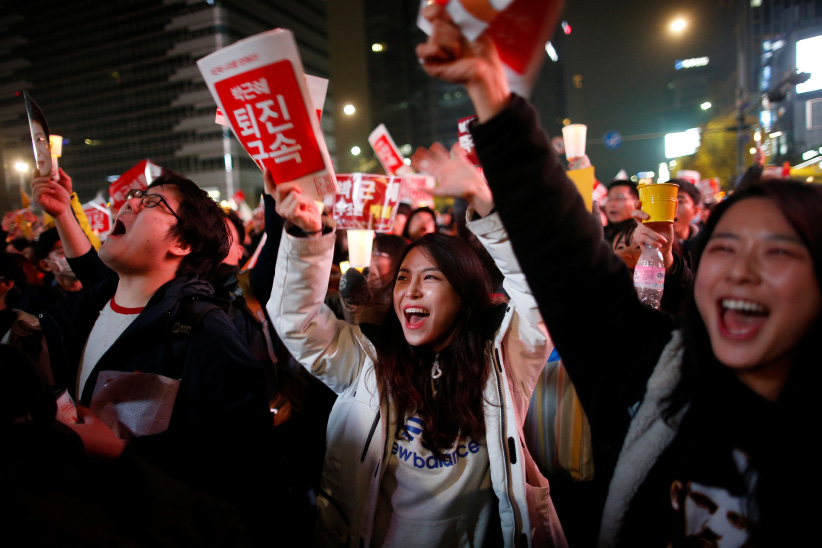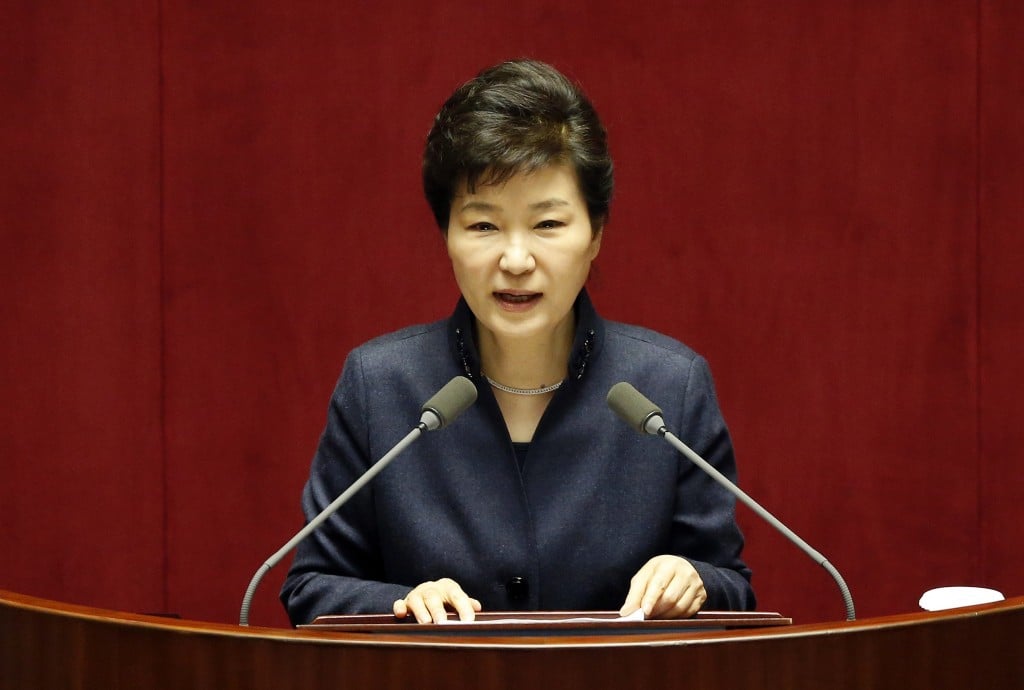In South Korea, the young rise up against a president—and a society
What the uprising against now-removed president Park Geun-hye reveals about the forces felt by South Korea’s young
People chant slogans as they march toward the Presidential Blue House during a protest calling South Korean President Park Geun-hye to step down in Seoul, South Korea, November 19, 2016. (Kim Hong-Ji/Reuters)
Share

Young Koreans have been given a civics lesson they’re likely to carry with them to their graves: it is possible, no matter how bad the odds seem, to topple a corrupt and abusive president.
For in South Korea, there has been a revolt of the young. The recent impeachment, removal, and arrest of former South Korean President Park Geun-hye was driven by people under 40, soon to be a minority in this rapidly aging society.
It’s a scandal that began when the president gave too much information and access to an old friend, Choi Soon-sil. Choi, a private citizen with no official government role whatsoever, was alleged to have had access to secret government documents, to have edited the president’s speeches, and to have personally intervened in state affairs. She then sold that access to others, including business executives like Jay Y. Lee, the vice-chair and scion of Samsung, South Korea’s defining corporation. The money Choi solicited went into a series of non-profits and businesses run by Choi—prosecutors allege she amassed US$65.5 million in bribes and handouts.
The companies that contributed to Choi’s foundations are a who’s who of corporate Korea. Samsung, Hyundai, SK, LG, POSCO, Lotte, GS, and Hanwha all contributed. These companies are known in South Korea as chaebol, enormous family-run businesses that represent more than 80 per cent of the South Korean economy, and are equally loved and loathed by the general population.
To students of South Korean history, this revolt of the young shouldn’t be a huge surprise. Young people have been at the forefront of Korean revolutionary politics since the birth of the republic in 1948. It was movements of young people that ousted Korea’s first president, the odious strongman Syngman Rhee, and sent him packing for exile in Hawaii. It was overwhelmingly young people who were imprisoned, tortured, and executed during the 19-year regime of General and, later, President, Park Chung-hee—Park Geun-hye’s father. It was young people who were mowed down by machine gun fire in Gwangju in 1980 for daring to oppose martial law following Park’s assassination and replacement by another dictatorial strongman, Chun Doo-hwan. And it was young people who overthrew that dictator in 1987 in a popular revolution, the year before Seoul’s Olympic “coming out party”.
On the other hand, though, it seems improbable to the casual observer that South Korean kids would fight, night after night for five months and two weeks, to topple a president over an obscure political scandal involving a too-close best friend and a group of companies for whom corruption is a normal way of business, and whose executives go to court like other CEOs go for a round of golf. But this scandal was the culmination of four years of abuse, corruption, and incompetence coming from the presidential Blue House—and, for Korea’s young, a culmination of social and historic forces.
Korean kids seem a lot like kids anywhere, obsessed with the newest cell-phone games, the latest K-pop stars, and dyeing their hair in colours that only bees can see. But that outward appearance of trendy happiness masks a darker reality. From kindergarten onward, students in South Korea are consumed with schoolwork; children as young as six will supplement their regular school days with long hours at hagwon, afterschool cram schools where they study as late as 10:00 PM., usually skipping meals, regular sleeping hours, and time with their families. Why? To get a perfect score on the suneung, Korea’s university entrance exam.
A perfect suneung score equals a spot at a prestigious university, which upon graduation, means a job at one of the chaebol. Seoul National University (SNU) is the school of choice; Samsung is the preferred company. Having a degree from one and a business card from the other puts you in the top-most ranks in this status-obsessed society.
Or does it? The chaebol have all cut back on their hiring. The expression “even a degree from SNU won’t get you a job anymore,” has become increasingly common, epitomizing the feeling of exasperation among Korea’s young.
The idea of working for a small- or medium-sized firm is anathema to most young Koreans. While in the West, young people tend to see a job with a small company as a stepping stone to bigger things, in Korea it’s often viewed of a sign that you’ve failed, despite all the money and effort your parents put into your education. Plus, small- and medium-sized firms pay only 62 per cent of what the chaebol pay; good luck getting married and out of your parents’ apartment on that. Many of these kids call themselves the “Sampo Generation,” meaning “three giving up”—giving up on love, marriage, and children, because prices are too high and wages too low.
The feeling of helplessness among young Koreans is such that some have even started using a name of their own invention for the country: Hell Joseon. Joseon is the name of the former Korean kingdom which was run on rigidly Confucian class lines; the “hell” part is self-explanatory.
In Hell Joseon, there are two types of people: gold spoons and dirt spoons. The gold spoons use the leverage of their families to succeed; one of the greatest outrages of this scandal is the allegation Choi used her pull to get her daughter into the prestigious Ehwa Women’s University. The dirt spoons are stuck scraping up the dregs that society has left them.
Some blame women, the poor, those from the liberal southwestern region of Jeolla, and Korea’s tiny immigrant community. Ilbe, a far-right online portal—akin to 4Chan in North America—has become Korea’s most popular website for complaining about women and immigrants stealing Korean men’s jobs, and liberals screwing up the country.
But mostly, young Koreans blame a corrupt power structure that may have made Korea rich in the past but is now hopelessly outdated, one that condemns many of them to drudgery, working 14-hour days for employers steeped in nepotism.

Which brings us back to Park Geun-hye, recently arrested, sitting in jail, and waiting to stand trial. Park was elected by an older, conservative generation that looks fondly upon her father’s reign; sure, he killed and tortured, but he also made one of the poorest countries in the world one of the richest, and he kept the country safe from communism. (Such was their pride that older conservative voters were even willing to ignore the fact that Park Geun-hye is a woman, a remarkable feat in a country that still has some of the worst indicators in the world for female emancipation.)
The young, on the other hand, never warmed to President Park, seeing her as part of a legacy of the old, brutal Korea. These feelings were further reinforced after she brought in a series of antidemocratic measures, including suing journalists, shutting down dissident political parties, and creating a single, arch-conservative high school textbook all students had to study.
Once the Choi scandal broke, it was the final straw; young Koreans had had it. Feeling they had nothing to lose, they stormed the streets night after night with their older allies in liberal, labour, and left-wing groups, demanding an end to the Park presidency.
And this time, the politicians listened. Park was impeached, with 234 votes in favour and 56 against in the 300-seat National Assembly. It was a secret ballot, so we can’t know exactly who voted which way. But at least half of Park’s own Saenuri party must have crossed the floor in order to secure the necessary two-thirds majority.
Park’s impeachment was upheld by the Constitutional Court by eight judges to zero—incredibly, every one of those judges was appointed either by Park herself, or her conservative predecessor, Lee Myung-bak.
On March 31, she was jailed pending the results of a criminal investigation, and that’s where she lingers today, along with her old friend Choi, Samsung’s Lee, and who knows who else in the coming months and years. Elections for a new president are scheduled for May 9, and it appears that one of Park’s liberal opponents will win.
But whatever happens, South Korea’s political scene will never be the same again. It’s true, the chaebol remain all-powerful, the old continue to outgrow the young, and memorizing facts for tests is still seen as the primary job of every young person. But the young are now armed with the knowledge they can, if they put the effort in, overthrow a president.
Dave Hazzan is a Canadian writer and journalist, and former resident of South Korea. He has been published in over 30 publications in seven countries. Follow him on Twitter at @DaveHazzan.